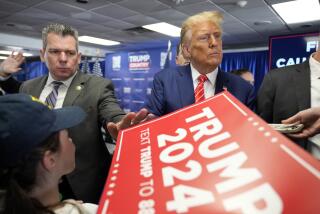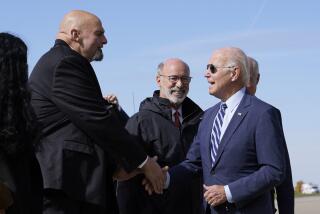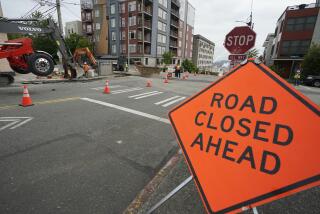Trump opens ‘infrastructure week’ without a plan, and calls for privatizing air traffic control

The Trump administration is calling this week ‘infrastructure week.’
President Trump employed all the trappings traditionally reserved for signing major bills into law as he kicked off “infrastructure week” on Monday: the stately East Room full of dignitaries, a four-piece military band to serenade, celebratory handshakes and souvenir presidential pens for lawmakers, promises of “a great new era” and a “revolution” in technology.
Yet the documents Trump signed amid all the pomp were not new laws or even an executive order. They were routine letters to Congress, relaying support for a minimally detailed plan in Trump’s budget to transfer control of the nation’s air traffic control system to a private nonprofit group.
This was the ceremonial opening to Trump’s full week of infrastructure promotion, which is scheduled to include a speech along the Ohio River on Wednesday and a White House meeting with mayors and governors on Thursday.
But it was also the latest example of a pattern of the administration claiming to have sent Congress fully constructed policies when it has provided only facades — creating the appearance of substantive heft and legislative action even in cases where there is next to none.
It will be year’s end, White House aides said, before Trump sends Congress even the general principles for achieving one of his biggest campaign promises: a $1-trillion investment over 10 years to rebuild the nation’s roads, bridges and other infrastructure.
Aides offered no timeline for submitting a bill to Congress to enact that promise, and they now say that one-fifth of the $1 trillion would come from the government and the rest — $800 billion — from private investors.
Trump has often touted his plan for a national rebuilding effort, the prospect of which has thrilled Wall Street. But what is known of his infrastructure agenda suggests it envisions less federal investment, not more. His budget would cut nearly 13% from transportation programs for the coming year, while eliminating billions of dollars more from grants currently targeted to build up infrastructure.
Trump’s critics have suggested that the president has made a habit of overselling major initiatives.
Trump touted the unveiling of his tax overhaul in April but released only a one-page set of bulleted talking points, far short of the devilish details needed to rewrite thousands of pages of the corporate and individual tax codes. Just last week, he tweeted that his tax bill is proceeding “ahead of schedule,” though he has submitted no bill to Congress and key details remain unresolved among Republican leaders.
Trump held a Rose Garden ceremony in May to celebrate House passage of a bill to repeal Obamacare — one that wouldn’t insure everyone, as he’d promised, but would end coverage for many millions — even as Republicans in the Senate served notice that the House bill was unacceptable.
His promised “beautiful wall” on the southern border is not yet on a drawing board. Likewise, many of the executive orders Trump has signed failed to live up to the president’s rhetoric. Among them: using American steel to build oil pipelines and protecting the religious freedom of church pastors who want to engage in political speech.
Trump chose to lead off infrastructure week with the air traffic control announcement because a plan had already been written in Congress, by Rep. Bill Shuster (R-Pa.), and debated for several years — “low-hanging fruit from a policy perspective,” according to DJ Gribbin, special assistant to the president for infrastructure.
The plan supported by Trump would create a nonprofit air traffic control entity that would take responsibilities from the Federal Aviation Administration, which would still have safety oversight, and replace existing taxes on air travel with user fees.
Trump said government bureaucracy has impeded progress and increased costs, and he promised that a private system with airlines’ and unions’ support would modernize the antiquated air traffic system, which still relies on ground radar “at a time when every passenger has GPS technology in their pockets.”
“It’s time to join the future,” the president said to applause from the invited guests.
“If we adopt these changes, Americans can look forward to cheaper, faster and safer travel,” he said. He described “a future where 20% of a ticket price doesn’t go to the government, and where you don’t have to sit on a tarmac or circle for hours and hours over an airport — which is very dangerous also — before you land.”
Trump said Obama administration officials “didn’t know what they were doing” when they spent billions of dollars to upgrade the system.
Sarah Feinberg, who was a chief of staff at the Transportation Department in the Obama years, called Trump’s comment “misleading” at best and said he was describing a long-term initiative that began in the George W. Bush administration.
The idea to privatize air traffic control, embraced in many other countries, has been debated since at least the Clinton administration. But it faces an uncertain future in Congress, in part because of bipartisan concerns over the proposed entity’s financial stability during downturns and its ability to cover the high costs of modernization, as well as worries from rural areas that they would face higher fees.
A bill to transfer the system died in the Senate last year.
The Trump administration promises that its fuller, still-to-come infrastructure plan will create $1 trillion in investment, in part by removing regulations that delay private sector investment and by using the smaller $200-billion government investment to stimulate more private spending.
But without a plan, those claims have been difficult to analyze, as have other questions about jobs promises, public-private partnerships and the effect on the economy and the federal deficit.
For example, senior administration officials, during a weekend briefing with reporters, said they were still debating one of the most fundamental details internally: whether they would try to identify ways to pay for the infrastructure plan themselves or pass that chore on to Congress. Skeptics question whether investors would see any financial benefit in many needed public works projects, like sewer facilities and levees.
“It’s a joke,” said Ed Rendell, former Democratic governor of Pennsylvania who is the co-chair of a bipartisan group called Building America’s Future that advocates for infrastructure spending. “And it’s somewhat of a cruel joke to the people who were looking forward to having jobs, created through investment.”
Democrats have pounced on that lack of specificity, as well as early suggestions that the private sector could get direct benefits from the plan.
“The president has not only failed to offer any credible plan to rebuild and repair our nation’s infrastructure,” House Minority Leader Nancy Pelosi (D-San Francisco) said in a statement Monday, “he has instead tried to slash transportation funding through his cruel and short-sighted budget.”
Infrastructure may be the area where Trump had his best chance to work with Democrats, who have long advocated for public works projects that are popular among labor unions and viewed as effective ways to stimulate the economy. But there is little evidence that he has reached out to them.
Twitter: @noahbierman
More to Read
Get the L.A. Times Politics newsletter
Deeply reported insights into legislation, politics and policy from Sacramento, Washington and beyond. In your inbox three times per week.
You may occasionally receive promotional content from the Los Angeles Times.







